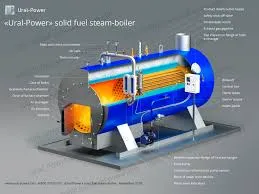
Nov . 22, 2024 16:36 Back to list
thermal oil heater pdf
Understanding Thermal Oil Heaters A Comprehensive Overview
Thermal oil heaters, also known as thermal fluid heaters, play a vital role in various industrial applications, providing efficient and reliable heating solutions. These systems utilize a heat transfer medium—commonly a synthetic oil or a thermal fluid—that circulates through the heater, absorbing heat from a combustion process before delivering it to the operational system. In this article, we will delve into the intricacies of thermal oil heaters, their components, advantages, and applications, fostering a clearer understanding of their significance in industrial settings.
Working Principle of Thermal Oil Heaters
The primary function of a thermal oil heater is to generate heat through the combustion of fuel, which can be natural gas, oil, or biomass. The process begins when fuel is combusted in a burner, generating hot gases that flow through a heat exchanger. This heat exchanger transfers the heat to the thermal oil circulating within the system. As the oil absorbs heat, it gets heated to a predetermined temperature, often exceeding 300°C (572°F). The heated oil is then circulated through pipelines to various equipment, providing the necessary thermal energy for processes such as drying, heating, or chemical reactions.
Key Components of Thermal Oil Heaters
1. Burner The burner is a crucial component that ignites the fuel to produce hot gases. It is designed to optimize combustion efficiency and reduce emissions.
2. Heat Exchanger This component is where the heat transfer occurs. The design of the heat exchanger can vary, but its primary role is to ensure effective heat transfer between the hot gases and the thermal oil.
3. Thermal Oil Circulation System This includes pumps, pipelines, and valves that facilitate the movement of the thermal oil through the heater and to the end-user applications.
4. Control System Advanced thermal oil heaters are equipped with control systems that monitor temperature, pressure, and flow rates, ensuring the system operates at optimal efficiency and safety.
5. Safety Mechanisms Given the high temperatures and pressures involved, safety devices such as pressure relief valves and over-temperature protection are integral to thermal oil heater design.
Advantages of Thermal Oil Heaters
Thermal oil heaters offer several advantages that make them an attractive choice for industrial heating applications
- High Efficiency These systems have a high thermal efficiency, often exceeding 90%, which results in lower fuel consumption and reduced operational costs
.thermal oil heater pdf

- Versatile Operating Range Thermal oil heaters can operate effectively at a wide range of temperatures, making them suitable for various processes requiring different heat levels.
- Environmentally Friendly By utilizing cleaner fuels and incorporating advanced combustion technologies, thermal oil heaters can achieve lower emissions compared to traditional heating methods.
- Stable Temperature Control The thermal fluid provides stable and uniform heating, which is essential for processes that require precise temperature management.
- Reduced Risk of Scale Formation The use of thermal oil minimizes the risk of scale formation, which is common in water-based heating systems, thus reducing maintenance requirements.
Applications of Thermal Oil Heaters
Thermal oil heaters are utilized across a diverse range of industries, including
- Chemical and Petrochemical For heating reactors, distillation columns, and for various thermal processing applications.
- Food Processing In processes like frying, drying, and pasteurization, where precise temperature control is crucial.
- Textile Industry In dyeing and finishing processes, where consistent temperatures are essential for product quality.
- Oil and Gas For enhancing the recovery and transportation of crude oil through steam generation and thermal applications.
Conclusion
In conclusion, thermal oil heaters are invaluable in modern industrial processes, offering high efficiency, flexibility, and environmental advantages. As industries continue to seek innovative and sustainable heating solutions, the role of thermal oil heaters will only expand. Understanding their workings, components, and benefits can help businesses make informed decisions regarding their heating needs, ultimately enhancing productivity and operational efficiency.
-
High-Efficiency Commercial Oil Fired Steam Boiler for Industry
NewsJul.30,2025
-
High-Efficiency Biomass Fired Thermal Oil Boiler Solutions
NewsJul.30,2025
-
High Efficiency Gas Fired Thermal Oil Boiler for Industrial Heating
NewsJul.29,2025
-
High-Efficiency Gas Fired Hot Water Boiler for Sale – Reliable & Affordable
NewsJul.29,2025
-
High Efficiency Biomass Fired Hot Water Boiler for Industrial and Commercial Use
NewsJul.29,2025
-
High-Efficiency Biomass Fired Hot Water Boiler for Industrial Use
NewsJul.28,2025
Related PRODUCTS






















